If the quest can begin with a personal encounter with God, how do we move from that encounter to understanding what God is telling us about creation? Can we really turn to the pages of scripture to understand the mysteries of creation? If we can, what does the scripture say? Scholars have debated these questions for centuries, from the time of the scientific revolution. To understand how modern scholars approach these questions, I need to tell you a story.
The following article is an excerpt from The Quest: Exploring Creation’s Hardest Problems, Ch. 4, pgs. 45-52. The views expressed reflect those of the authors, and not necessarily those of New Creation.
The Medicis
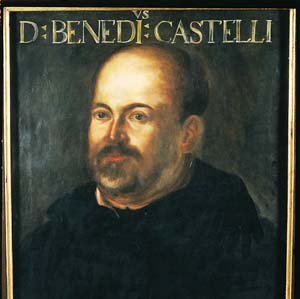
It was a Wednesday morning in Pisa, near the western coast of what is today Italy, and Benedetto Castelli was having a chat with the Grand Duke of Tuscany. Castelli gave a detailed report on the state of the University of Pisa, where Castelli was a mathematics professor. The Grand Duke was pleased with the report, and the conversation then turned to the latest curiosity of the day, the telescope. Castelli confirmed that he did indeed own a telescope, and he then began describing the “Medicean planets,” which we now know as Europa, Callisto, Ganymede, and Io, the four largest moons of Jupiter. These moons had been discovered only three years previously, and they had been named after the house of Medici, the most powerful and influential family in nearby Florence. The Grand Duke himself was Cosimo II de’ Medici.
At this point, their conversation turned to the other hot topic of the day: Did the sun orbit the earth, or did the earth orbit the sun? The Grand Duke’s mother, Christina of Lorraine, asked Castelli if the Medicean planets were real and not just a trick of the telescope. Castelli replied that they were indeed real, and Cosimo Boscaglia agreed with him. Boscaglia was a professor of philosophy and another favorite of the Grand Duke, and even though he accepted the existence of Jupiter’s moons, he vocally denied the movement of the earth. According to Boscaglia, the idea that the earth orbited the sun contradicted the clear teaching of the Bible.

By Unidentified painter – Polo Museale Fiorentino, Inventario 1890: online database: entry 4338 (Italian), Public Domain, https://commons.wikimedia.org/w/index.php?curid=16197127
Castelli remained silent on this point, having been warned by his boss at the university not to debate the structure of the cosmos. The subject had become a point of contentious debate, and too many felt as Boscaglia did. The earth could not move, nor could the sun be the center of the cosmos. These ideas were supposedly contrary to scripture, and the overseer of the University of Pisa was keen to avoid stirring up trouble on this matter. Castelli assured him that he would not engage the topic, and he was true to his word on that Wednesday with the Medicis.
As he was leaving, a servant of Christina’s called him back. The Grand Duchess wanted to talk further about the Bible and the motion of the earth. You can imagine how Castelli must have felt at this summons, but he went back anyway. He found himself in a room facing Cosimo II, his wife archduchess Maria Maddalena, the Grand Duchess Christina, and, of course, Dr. Boscaglia. What followed was a spirited theological defense of the motion of the earth, after Castelli gave “suitable disclaimers,” which we may surmise might have been a confession that he only presented the defense for the sake of argument. By his own account, Castelli convinced those in the room, including the Grand Duke and Archduchess, but the Grand Duchess Christina continued to question him. What Christina really believed we don’t know for sure. Castelli got the impression that she was just playing devil’s advocate to see how he would answer. Ominously, Boscaglia remained silent during the entire discussion.1
Sensing trouble from this encounter with the Medicis, Castelli wrote almost immediately to his good friend Galileo Galilei to describe the conversation. Galileo had discovered Jupiter’s moons in January of 1610, and Galileo gave them the name “Medicean planets,” in honor of his former student and benefactor, Cosimo II.
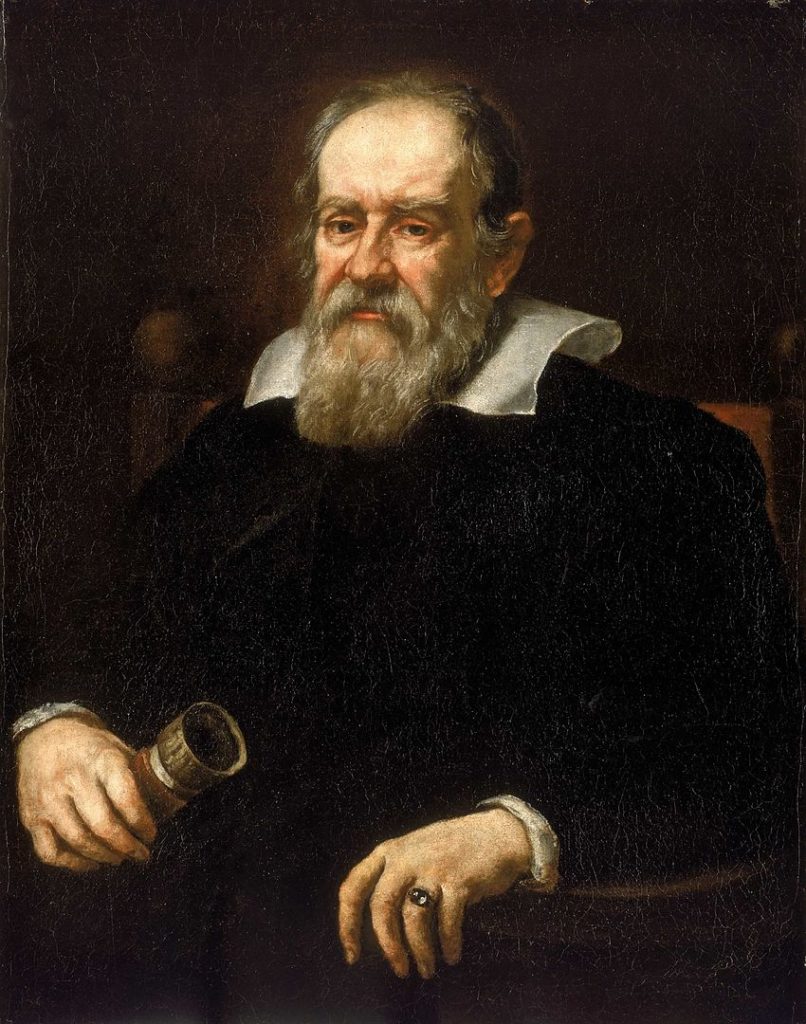
By Justus Sustermans – http://www.nmm.ac.uk/mag/pages/mnuExplore/PaintingDetail.cfm?ID=BHC2700, Public Domain, https://commons.wikimedia.org/w/index.php?curid=230543
Galileo was also the chief instigator of the debate over the motion of the earth, stirring the pot most recently with a treatise on sunspots, in which he reported the existence of spots on the sun that moved as the sun rotated. This contradicted the traditional belief that the sun was flawless and unmoving. Castelli’s letter would spur Galileo once more to defend his belief that the earth moved around the sun. Galileo began working on a letter directly to the Grand Duchess herself, explaining how he could hold to the motion of the earth around the sun and make sense of the Bible at the same time. The Letter to the Grand Duchess Christina became Galileo’s most enduring contribution to the faith/science discussion and the tipping point in his ongoing dispute with theological authorities.2 The ideas expressed in this letter were submitted to the Inquisition (in the form of an early draft sent directly to Castelli), who warned Galileo less than three years later not to believe or teach that the earth moves or the sun is the center of the cosmos.
Galileo’s Accommodation
What was in the Letter to the Grand Duchess? Galileo began with a simple affirmation of the truth of scripture, but he qualified that affirmation with what seems to be a reasonable caution.
I believe nobody will deny that it is often very abstruse, and may say things which are quite different from what its bare words signify. Hence in expounding the Bible if one were always to confine oneself to the unadorned grammatical meaning, one might fall into error. Not only contradictions and propositions far from true might thus be made to appear in the Bible, but even grave heresies and follies. Thus it would be necessary to assign to God feet, hands, and eyes….
3
Why does this happen? Why isn’t scripture more clear and understandable? Galileo had an answer.
These propositions uttered by the Holy Ghost were set down in that manner by the sacred scribes in order to accommodate them to the capacities of the common people, who are rude and unlearned. For the sake of those who deserve to be separated from the herd, it is necessary that wise expositors should produce the true senses of such passages, together with the special reasons for which they were set down in these words. This doctrine is so widespread and so definite with all theologians that it would be superfluous to adduce evidence for it.
4
Accommodation is Galileo’s answer. Not everything in the Bible can be taken literally because sometimes the Holy Spirit used figures of speech or metaphors to communicate truths that were hard for people to understand.
The Bible is accommodated to everyone so we can all understand. I like to explain it by comparing our intellect to God’s. God is infinite and omniscient. His understanding is far above ours, and compared to God’s, our intellect is barely different from an ant’s. Or maybe a piece of driveway gravel. For God to reveal himself to us, he must speak in language that we can understand, and the human language that he uses includes all those figures of speech. He has to talk to us the way we talk.
Now there’s nothing wrong with accommodation. It’s a theological necessity, but Galileo took the idea one step further. Galileo concluded that because the Bible is accommodated, we can never use the Bible to tell us anything about the physical reality of creation.
This [accommodation] being granted, I think that in discussions of physical problems we ought to begin not from the authority of scriptural passages, but from sense-experiences and necessary demonstrations…. It is necessary for the Bible, in order to be accommodated to the understanding of every man, to speak many things which appear to differ from the absolute truth so far as the
5
bare meaning of the words is concerned. But Nature, on the other hand, is inexorable and immutable; she never transgresses the laws imposed upon her, or cares a whit whether her abstruse reasons and methods of operation are understandable to men. For that reason it appears that nothing physical which sense-experience sets before our eyes, or which necessary demonstrations prove to us, ought to be called in question (much less condemned) upon the
testimony of biblical passages which may have some different meaning beneath their words.
We need to pay attention very carefully to what Galileo says here. Galileo claims that the Bible is hard to understand, and its words may be interpreted in many different ways. Creation, on the other hand, and science in particular, is essentially infallible. When science speaks on a subject, that settles it. If the Bible seems to contradict science, the Bible must be accommodated on that point. We only need to discover the true meaning beneath the words, because what it says cannot be what it means, because science says otherwise. With this interpretive maneuver, Galileo essentially set aside all biblical and theological objections against his ideas about the motion of the earth around the sun. None of them have any weight or force behind them, because the Bible might be accommodated when it talks about the sun and the earth. There is no room in Galileo’s model for careful exegesis to determine what the biblical text might be saying as a corrective or boundary for science. No, science is the deciding factor. If science says something, the Bible must be re-interpreted to fit.
My description of accommodation is unsettling and often upsetting to modern theistic evolutionists. They do not like such blunt talk, and they do not want to admit that they are re-interpreting scripture according to the dictates of science. Yet, that is precisely what Galileo argues in his Letter to the Grand Duchess, and it’s hard to argue that that is not happening today. The recent and steady parade of books describing the textual and theological gymnastics that evangelical scholars must perform to fit evolution into the Bible speaks for itself.6
Galileo’s accommodation is everywhere in the faith/science discussion today, especially when it comes to evolution. When the theory of evolution appeared in the nineteenth century, religious leaders and scholars who did not immediately condemn it very much wanted to wait and see how the scientific debate would turn out.7 No one wanted to repeat Galileo’s fate of being forced into a humiliating rejection of his own beliefs about the cosmos by a church that was ultimately just wrong. Even now, no one wants to be Galileo, and no one wants to be the church that condemned him.
Accommodating Evolution
How do we reconcile evolution and the Bible? Supposedly by accommodation. As the story goes, God performed a loving act of kindness by accommodating the story of creation (which was really evolution) to the myths of ancient Sumer, Canaan, and Egypt so that the Israelites could see how their God was different. The pagan gods were many, but the true God was one. The pagan gods created through war and conflict, but the true God absolutely controlled every step of creation. The pagan gods created out of the chaos of a world that already existed. The true God created everything with no hint of chaos. These are the great truths of Genesis. The details, which seem so plainly historical, are all just accommodated. The dust of the ground, the talking serpent, the forbidden fruit—they’re all just parables or figures of speech. In our modern world, as science has opened our eyes to the truth about evolution, we can finally see what the true meaning of the Bible was all along.
Does that really work, though? Can we really believe that the only true meaning of Genesis is not found in the details and the words of the text but in the theological content it was supposed to convey? To put it simply, would God accommodate his revelation to cultural error?
As I said, I completely affirm accommodation as a general principle, because language is full of phrases and words that do not mean what they appear to mean. Even today, anyone with an internet connection can find detailed tables describing the time of sunrise and sunset, even though we all know that the sun isn’t really moving. The earth is turning. The sun only appears to “rise” and “set.” This is one of the reasons that I think Galileo’s critics were wrong. I think accommodation in that instance works just fine.
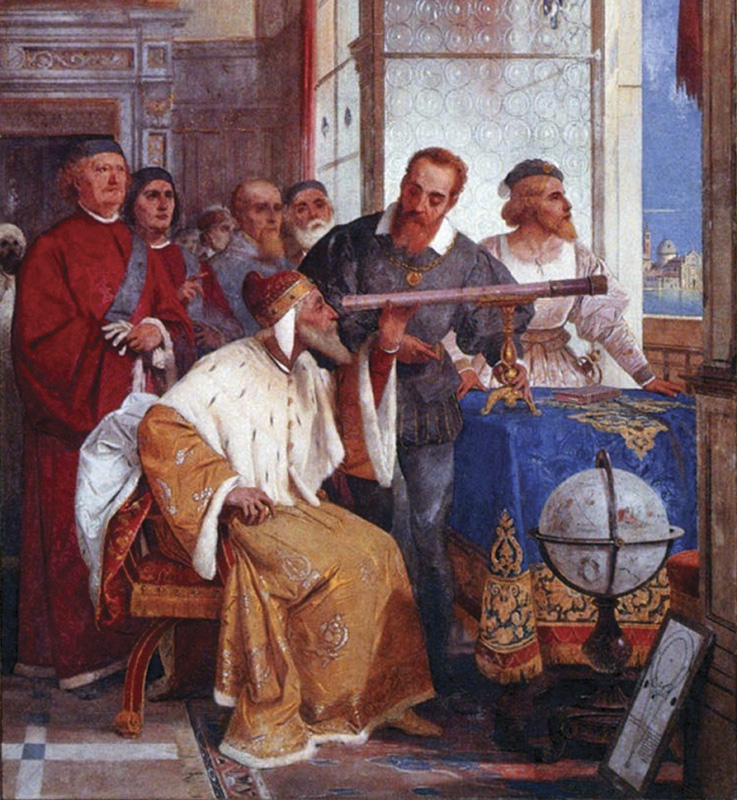
By Giuseppe Bertini – Embedding web page: http://www.gabrielevanin.it/S.%20Marco%201609.htmImage: http://www.gabrielevanin.it/Bertini.jpg, Public Domain, https://commons.wikimedia.org/w/index.php?curid=9500742
When the Bible describes the motion of the sun, it uses the same sort of language our modern culture does with all our knowledge of the universe. We talk about the motion of the sun because that’s what it looks like, and so does the Bible. God’s revelation is unquestionably accommodated to figures of speech.
But does that mean God accommodates error? What if the Bible contained a passage that detailed the structure of the cosmos and described in unmistakable detail the motion of the sun around the earth? Or what if the Bible contained a treatise on anatomy and physiology that endorsed the old idea of the doctrine of the humors? Or a treatise on physics that listed the four elements earth, wind, fire, and air? Is that something God would do?
Because if evolution is true and Genesis is accommodated, that is exactly what God did. He took erroneous ideas about the origin of the universe and wrote them right into the text of the Bible. He could have revealed this theology in another way. Several creation psalms and even the end of Job present God as the absolute, unrivaled creator and sustainer of the universe without telling any detailed story about creation. He didn’t have to tell a series of creation fables, but he did. He preserved them for thousands of years, and all the while, his followers assumed they were historical and not fables at all. He knew that one day we would discover the “truth” about evolution, and he knew that that discovery would cause a great crisis of faith that continues to this day. And he knew that the discovery would come at a time when the population of the world was the greatest and communication was most sophisticated so that the greatest number of people would be offended and fall away because of evolutionary science. With all that knowledge, he did it anyway. He included a myth at the beginning of the Bible knowing that Christians for millennia would interpret it as a historical account of the origin of the world and knowing the havoc that would ensue when the truth was discovered.
Does that sound like a God who loves truth? Does that sound like a God who loves people? Or does that sound like a cruel and deceptive god who sets up the human race in a cosmic prank that would alienate millions? Maybe even billions? I know my God, and I do not recognize the great trickster god of evolution. That is not my God. My God recorded the history of creation in Genesis precisely because he knew that one day we would misunderstand the works of creation in the hubris of the scientific revolution. He lovingly and carefully preserved for us the truth about creation. In the beginning, God created, and it was very good.
If accommodation to error is wrong, what then can we say about the creation of everything? What should we conclude from the first eleven chapters of Genesis? Do we have to ignore hundreds of years of scientific research, effectively sticking our heads in the sand, in order to be “good Christians?” Is that really what God wants?
Footnotes
- You can read Castelli’s account, which I have summarized here, in his letter to Galileo translated into English in Drake, Stillman. Discoveries and Opinions of Galileo. New York: Anchor Books, pp. 151-152 ↩︎
- Read the original Letter to the Grand Duchess Christina in Drake 1957, pp. 175-216. ↩︎
- Drake 1957, p. 181. ↩︎
- Drake 1957, pp. 181-182. ↩︎
- Drake 1957, pp. 182-183 ↩︎
- I’m thinking especially of the work of Peter Enns and John Walton. Enns, Peter. 2012. The Evolution of Adam. Grand Rapids, MI: Baker Publishing Group. Walton, John H. 2009. The Lost World of Genesis One. Downers Grove, IL: Intervarsity Press. ↩︎
- For example, see Artigas, Mariano, Thomas F. Glick, and Rafael A. Martínez. 2006. Negotiating Darwin: The Vatican Confronts Evolution 1877-1902. Baltimore, MD: The Johns Hopkins University Press ↩︎
The author, Dr. Todd Wood, has graciously granted New Creation permission to publish selected sections from The Quest: Exploring Creation’s Hardest Problems. To purchase a copy, please visit our online store.

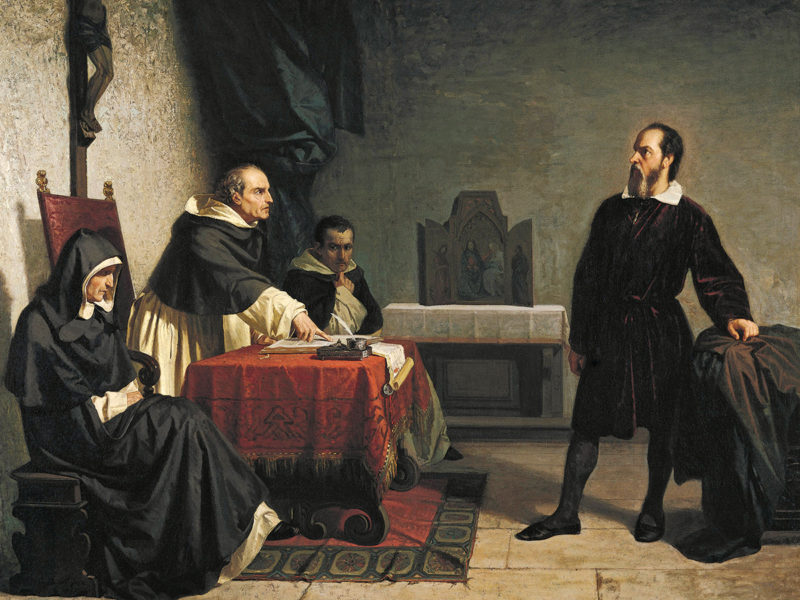





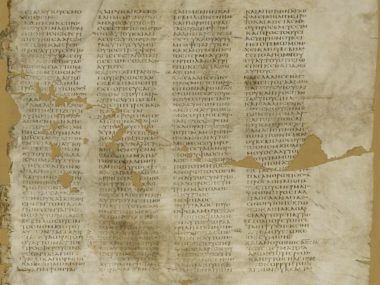




I disagree with your opinion regarding the universe. Man tends to embellish what is beyond our mortal compression. Yet the Bible is unquestionably clear regarding Earth, sun, moon, stars and wondering stars not only in Genesis but in several books and verses. All we are asked to do is read the entire book. I would also encourage anyone reading this article, as well as its author, to research the true meaning of Cosmos, how the Milky Way got its name, and the names and meanings behind each planet. Hopefully you will find the truth behind this great deception as well as the many 6s applied to the globe model; its distance from the sun, the circumference, and calculation of the curb. We are in the end times. Many will be deceived. Trust your eyes and the Word of our Father. Shalom.
Good evening, Dr. Wood. Thanks for an interesting essay. As someone who has spent a lot of time interacting with the new crop of “biblical geocentrists”, I’m going to push back a bit on your central example. You write, “I completely affirm accommodation as a general principle, because language is full of phrases and words that do not mean what they appear to mean….The earth is turning. The sun only appears to ‘rise’ and ‘set.’ This is one of the reasons that I think Galileo’s critics were wrong. I think accommodation in that instance works just fine.”
An observation and a couple of questions here. It seems to me that when the Hebrews spoke of the sun “coming out” and “going in” (by which they meant with respect to the horizon, just as in the more modern language of “rising” and “setting”) they understood that to be literally what was happening. To them this was not the language of accommodation – to them it was literal. I think it’s fair for the neo-geocentrists to point to the fact that the ancients really did think this was the way things physically were. None of the observational evidence that they had at the time would give them any reason to think otherwise.
It’s only in light of subsequent observations many centuries later using increasingly sophisticated tools that the ancient understanding of cosmological reality was finally overthrown. Only then were the relevant Scripture passages reinterpreted as pertaining to appearances, not physical reality. This seems obvious to us now, we just take it for granted, but it was far from obvious back in the day.
You say “I think accommodation in that instance works just fine,” but I’m wondering what objective principle you’re using to determine that? The neo-geocentrists would argue that it doesn’t “work just fine” for at least two reasons, first because you’re still having to back off from the literal interpretation of Scripture based on the (“so-called definitive”) findings of modern science and, second, because it would seem to present you with the same question you raised at the end – wasn’t God being deceptive in casting these passages in geocentric language that just happens to align perfectly with what men observed for millennia? To the unaided eye, the universe certainly does seem geocentric. The Earth certainly does seem to be motionless and the Sun certainly does seem to go around it. And the language of Scripture matches that exactly. God easily could have revealed the truth about the Earth orbiting the Sun and even its place with respect to the greater cosmos without difficulty. Instead, He chose to use language that He knew would be taken literally for millennia and that would cause some consternation when scientific discoveries showed it to be literally untenable (or untenable if literal, if you please.) If you re-read your last few paragraphs, I think it’d be clear that the neo-geocentrists could (and do!) make exactly the same set of arguments. They’d point out that you’ve already capitulated, you already accommodate your interpretation of Scripture to modern scientific discoveries. Why not be more consistent?